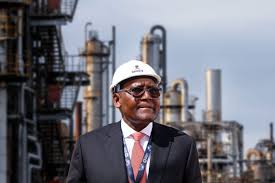The Depot and Petroleum Products Marketers Association of Nigeria (DAPPMAN) has said its members can only rely on the Dangote Petroleum Refinery for Premium Motor Spirit (PMS), also known as petrol, as the refineries owned by the Nigerian National Petroleum Company Limited (NNPC) are not yet fully producing petrol.
DAPPMAN’s Executive Secretary, Mr Olufemi Adewole, made this known during a discussion with our reporter on Sunday. According to him, DAPPMAN members are willing and ready to lift petroleum products from the Dangote refinery, which he described as the only viable petrol-producing facility in the country at the moment.
He said the refineries in Port Harcourt and Warri are only producing naphtha, not the petrol Nigerians need, and for that reason, DAPPMAN members are not lifting products from them. “The NNPC refineries, both the revamped Port Harcourt and Warri, are not yet optimally producing PMS; they are producing naphtha. Our members will not go to them for now,” Adewole said.
He explained that the association is open to working with Dangote refinery, but if they are not able to get products locally, they will have no choice but to start importing fuel, as permitted by the Petroleum Industry Act (PIA). He also stressed that the depot owners would prefer to buy from local producers instead of importing, but the current situation leaves them with limited options.
“In-country production should be ramped up because we need more sources of getting the product. It is not our wish to import; we would rather buy locally and sell to Nigerians, but the opportunities are limited,” he said.
Adewole also expressed concern that the Dangote refinery prefers to sell through selected marketers using gantry supply, rather than selling in bulk to depot owners who usually lift 15 to 25 metric tonnes at once. He said if Dangote opens up its portal and allows DAPPMAN members to load their vessels, the association would be able to patronise the refinery more effectively.
“We are depot owners. We pick in bulk. We are picking 15 – 25 metric tonnes. So, if the portal is open and we are allowed to load our vessels, then it’s a lot easier for us,” he explained.
Adewole added that DAPPMAN has depots across the country and members are ready to pick PMS and diesel from the Dangote refinery, but there is uncertainty about whether the refinery is ready to sell to them directly. He confirmed that discussions with Dangote management are ongoing and the association is still hopeful for a favourable arrangement.
He said DAPPMAN wants to ensure that Nigerians get quality petroleum products at affordable prices, regardless of whether the products are sourced locally or imported. “If we import cargos at a cheaper rate, we will sell to Nigerians at a cheaper rate,” Adewole said.
He also emphasised that the Dangote refinery is a source of national pride and that the association wants to work with the facility in a way that does not lead to financial losses. “It’s our pride that the Dangote refinery is up and running. We want to work with Dangote, but we are also not going to keep losing money because the bottom line is that we are in business,” he said.
In November 2024, NNPC announced that the 60,000 barrels per day Port Harcourt refinery resumed operations after years of rehabilitation. According to NNPC’s spokesperson, Olufemi Soneye, the old Port Harcourt refinery was operating at 70 percent of its installed capacity and was expected to ramp up to 90 percent.
Soneye said the refinery was producing diesel, low pour fuel oil (LPFO), straight-run gasoline (naphtha), kerosene, and liquefied petroleum gas (LPG). He explained that the naphtha is blended to produce PMS, using blending components from Indorama Petrochemicals. He insisted that blending is a normal practice in refineries worldwide.
However, a report released in April 2025 by the Nigerian Midstream and Downstream Petroleum Regulatory Authority said the Port Harcourt refinery was operating below 40 percent capacity. It also said that the Warri refinery had been shut down since January 25, 2025, due to safety concerns in its Crude Distillation Unit Main Heater.
It was also reported that the Managing Directors of the Port Harcourt, Warri, and Kaduna refineries were recently removed by the new board of NNPC.
Efforts to get further clarification from NNPC spokesperson Olufemi Soneye were unsuccessful, as he has not responded to messages sent to him.
